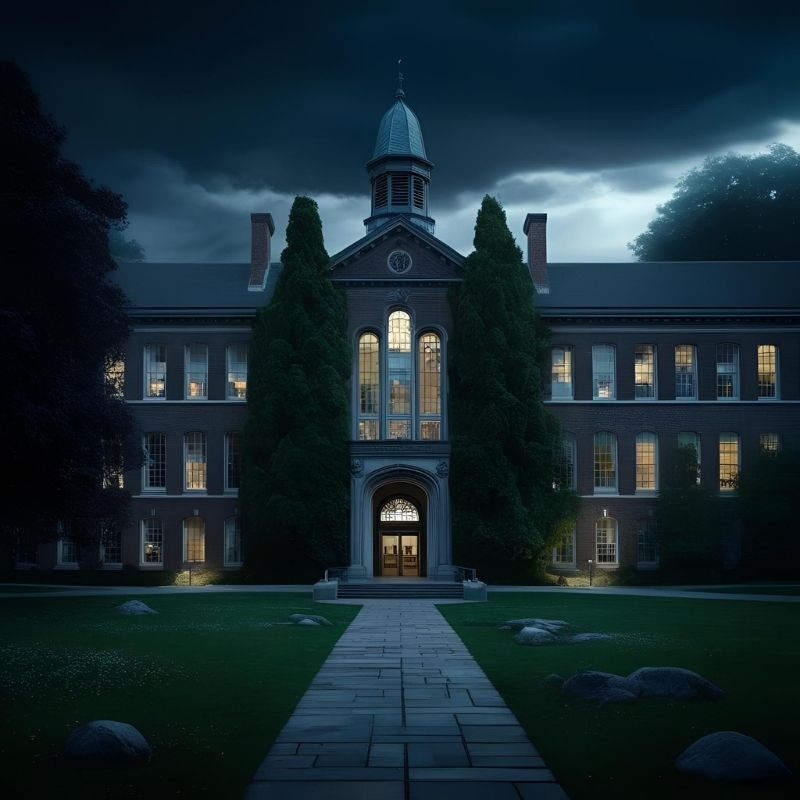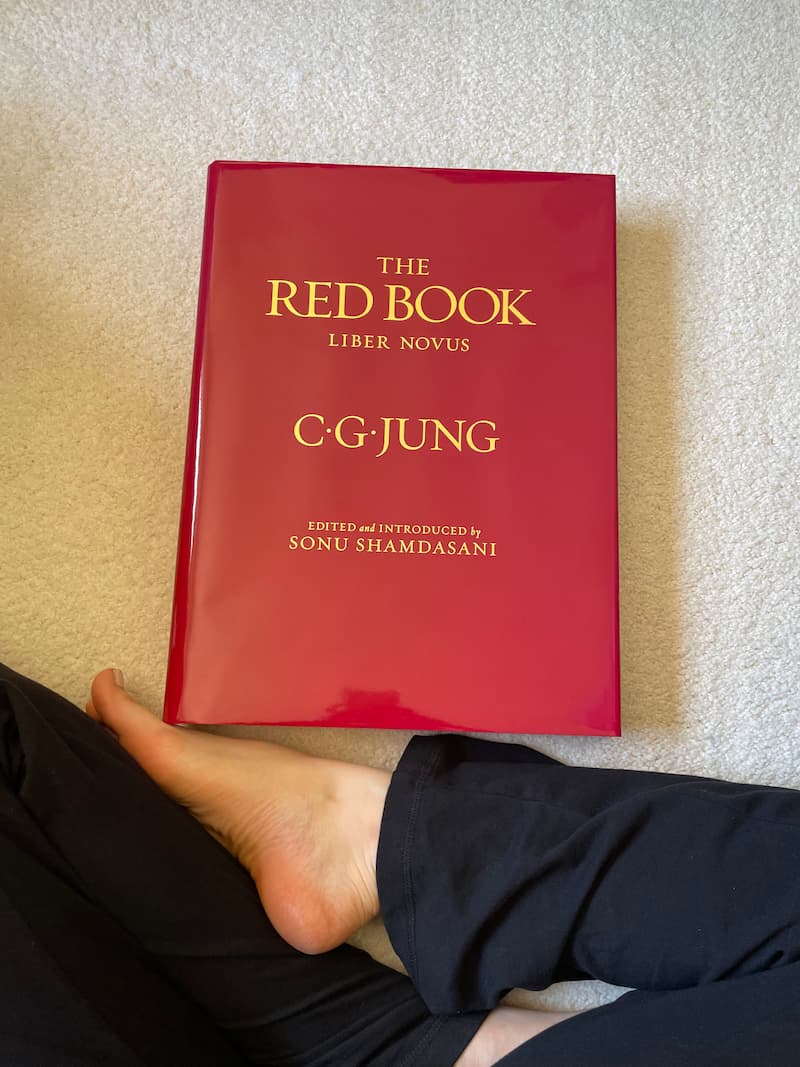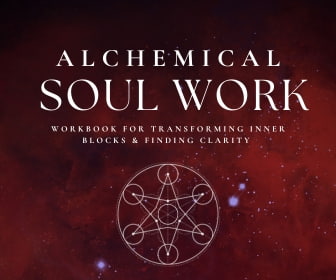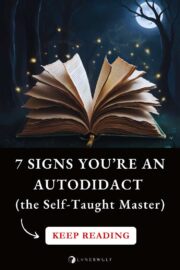Leonardo da Vinci, Eckhart Tolle, Stanley Kubrick, Frida Kahlo, Benjamin Franklin, Krishnamurti, Jane Austen, Steve Jobs – some of the greatest people in history were (and are) self-learners or autodidacts.
As author and autodidact Helen Beatrix Potter once noted: “Thank goodness I was never sent to school; it would have rubbed off some of my originality.”
In a world where formal education is increasingly failing us on numerous fronts and the bite-sized dopamine-fuelled mediocrity of social media is decreasing our capacity to think critically, being an autodidact is more needed than ever before.

Soul Work Compass Course:
Feeling lost, stuck, and trapped in repetitive cycles of pain? Discover your Soul's Compass to reclaim your purpose and find your path to freedom.
⭐️⭐️⭐️⭐️⭐️ "I have been a long-time subscriber to their website, and it’s one of my favorites by far ... It is rare to find this type of teacher." – Shar B.
I’ve recently fallen in love again with my local library, and let me tell you, self-directed learning is empowering and feels wholesome and soul-nourishing in a way that’s hard to express fully.
Not only that, but being an autodidact is a huge part of the conscious and intentionally lived life path and spiritual journey as a whole.
You’ll find that you’ll experience way more synchronicity, bursts of exhilarating discovery, and sometimes even moments of mystical realization when reading and learning.
Learning makes life richer and deeper, so why not embrace being an autodidact?
Table of contents
- 7 Signs You’re an Autodidact
- Why Formal Education Can Limit Your Mental, Emotional, and Spiritual Growth
- I) My Experience With University
- ii) 5 Reasons Why Formal Education Can Be Soul-Sucking
- 1. It imposes pressure on you and an immense amount of stress.
- 2. It robs you of all of your time.
- 3. It robs you of psychological freedom.
- 4. It motivates you with fear.
- 5. It kills your creativity.
- (Bonus) 6 . It creates mental rigidity and a dislike of ongoing learning.
- The Connection Between the Spiritual Journey and Self-Directed Learning
- How to Become an Autodidact (9 Suggestions)
7 Signs You’re an Autodidact

Not everyone is an autodidact. Not everyone has a passion for self-directed learning. Some people are content to learn passively or not at all, and that’s that.
If you’re here reading this right now, I’d say there’s an extremely high chance you’re an autodidact.
But if you’re not sure, here are some signs:
Want to get LonerWolf at the top of your Google search results?
- You’re a high agency person, meaning that you live in an active, intentional, and focused way by taking responsibility for your life and being self-directed.
- You have a lust for learning, and you’re wildly curious – aka, you find joy in researching and discovering new ideas, methods, philosophies, etc.
- You value depth and enjoy long-form content like books, articles like this, long podcasts, and in-depth videos.
- You feel repelled by social media because it feels too shallow, and you don’t like passively consuming superficially regurgitated info-tainment.
- You feel suffocated by formal education as it kills your desire to learn or grow.
- You’re a gifted deep thinker or feeler, what Polish psychologist Kazimierz Dąbrowski called “overexcitability,” meaning that you have a heightened response to external stimuli and stronger reactions compared with others.
- Your idea of relaxation is to sit down with a good book – simple, but self-explanatory. ;)
Can you relate to these signs? If so, congratulations! You’ve just joined the ranks of some of the most creative and innovative people in the world.
Have I missed any signs? If so, share them below in the comments.
Why Formal Education Can Limit Your Mental, Emotional, and Spiritual Growth

Okay, I have a lot to say about this, so get ready.
Firstly, many of the most passionate and talented writers, artists, film directors, philosophers, and musicians out there are vehemently against traditional forms of education.
Mark Twain, George Bernard Shaw, Albert Einstein, and Margaret Mead, for instance, were all highly talented autodidacts who spoke up against the innumerable limitations of formal education.
Bertrand Russel, for instance, was once recorded saying that “men are born ignorant, not stupid; they are made stupid by education“, and Henry David Thoreau was attributed to saying, “What does education do? It makes a straight-cut ditch of a free, meandering brook.”
So, back to the question: Why does formal education often limit your mental, emotional, and spiritual growth? Let’s start with a personal sharing.
Before that, here’s a quick disclaimer: If you’re one of those people who loved university or college, more power to you. You can absolutely be an autodidact and a person who was formally educated. I’m only speaking from my own experience and what I have learned from others who have gone the traditional route. Also, some professions benefit from structured formal learning (doctors, pilots, electricians, accountants, etc.). You wouldn’t want a self-taught surgeon doing triple bypass surgery on you, would you? :) This critique is mainly aimed at the humanities.
I) My Experience With University

I quit university for a number of reasons. One: I hated it. Two: I learned very little. Three: It was slowly poisoning my love for self-directed learning.
In fact, during my years at university, I stopped reading, I stopped inquiring, and I stopped doing what I loved the most: writing – which was ironic because I was studying to become a librarian at the time (later contemplating being a psychologist).
Would you like to save this?
Your information will never be shared.
Here’s the reality: all passion, drive, and curiosity to learn about the mysteries of life slowly evaporated during my years in formal education.
The days, weeks, and years of homework, assignments, mandatory readings, and exams slowly drained me of my creativity and lust for life, like a cancerous tumor.
All I can say is that thank god I finally came to my senses one day and quit, for good.
Luckily, I’m not the only deviant “college dropout” who holds these sentiments. In fact, many people, from Maya Angelou to Bill Gates, never completed college or university.
Of course, not all college drop-outs do well in real life – that’s a misconception. But there’s nothing wrong with opting out of formal education, especially if it’s killing your love of learning and therefore constricting your ability to psychospiritually grow and transform.
ii) 5 Reasons Why Formal Education Can Be Soul-Sucking

I realize that some people love the experience of formal higher education – and sure, there are benefits. More job security (in some cases), networking, building new friendships, group learning, unique opportunities, and so on.
Don’t get me wrong; you can be both an engaged student and a passionate autodidact – they don’t necessarily cancel each other out.
But I’ve observed that the more deeply steeped in formal study a person tends to be, the more the sacred love of learning begins to wither and die.
Here’s why formal education can be so soul-sucking:
1. It imposes pressure on you and an immense amount of stress.
Basically, the rule is “if you don’t learn this by this time, you’ve failed.” Deadlines create an immense amount of stress and pressure, and this is not a healthy approach towards learning.
I remember the feeling of pure, breathtaking freedom that came with quitting uni forever. It was as though a heavy mental burden had been lifted, and I suddenly came to realize how much psychological tension the whole institution had put me through.
The amount of anxiety you have to deal with while studying is completely unnecessary.
2. It robs you of all of your time.
Hours of dutiful reading, hours of highlighting textbooks, hours of strained eyeballs staring hopelessly at the computer screen … Forget cultivating any meaningful interests or hobbies, studying eats up all your energy, time, and life force vitality.
3. It robs you of psychological freedom.
During my stint as a uni student, I noticed this bizarre phenomenon happening inside of me. Whenever I stole a few minutes or hours for myself, I often felt guilty and edgy, as though I was doing something illegal. Basically, my mind was craving to study, not out of free desire, but imposed fear that I was somehow slacking off or not working hard enough. Talk about servitude.
4. It motivates you with fear.
In many parts of the world, we’re taught from a young age that if we want to be special, successful or amount to anything important in life, we must slave away for 3-4 years to earn a slip of paper that entitles us to a “bachelor” or “masters” title.
Most people go to college either out of parental obligation or paranoia. Both are motivated by fear.
5. It kills your creativity.
Everything in colleges and universities is predetermined, from the syllabus to the resources, set readings, and excursions.
College tells you what to do and expects you to follow implicitly. You must walk within their strict boundaries at all times, using their limited materials to answer their limited questions in their limited formats.
Wild, unbridled curiosity is discouraged. Dull-minded conformity is promoted instead.
(Bonus) 6. It creates mental rigidity and a dislike of ongoing learning.
As Albert Einstein was recorded saying,
“One had to cram all this stuff into one’s mind, whether one liked it or not. This coercion had such a deterring effect that, after I had passed the final examination, I found the consideration of any scientific problem distasteful for an entire year.”
If even famous physicist Albert Einstein was turned off science by formal education, imagine what effect it has on us!
Even I experienced this with my “library science” studies. I love libraries and what they stand for, but after studying to become a librarian, I truly came to understand the meaning of the word “abhor.”
The fact is, many formal education institutions cram a bunch of knowledge into your brain and expect to make a professional out of you while slowly killing your capacity to be curious and creative.
Sure, you may have finally gained your socially acceptable degree, but the years of stress and dutiful learning have created a rigid, institutionalized brain.
Furthermore, those of us who have undergone the torture of education camps will understand how nauseating the word “education” becomes after graduating.
Who the hell wants to become a “lifelong learner” and much less an autodidact after experiencing the stress of a formal education?
It took me ages to get interested in self-directed learning again after serving my time at uni – about a year and a half (some never get it back). Unconsciously, I identified any form of education with classrooms, exam papers, and hours spent squinting at dry textbooks.
Thankfully, I gradually realized that obtaining knowledge doesn’t have to be excruciating and burdensome, and I’m glad I did.
These days, being an autodidact is my “bread and butter” – or how I make a living for myself, thanks to the democratization of learning via the internet.
Sadly, many people come out of college and never look back, losing all interest in learning and growing, thus missing out on a whole side of life – one that is rich with the rainbow of other people’s lived experiences, lessons, and insights.
The Connection Between the Spiritual Journey and Self-Directed Learning

As I mentioned previously, being an autodidact is a huge part of the spiritual journey and path of healing.
In fact, without a curiosity to learn, explore, and expand our intellectual horizons, fuelled by inner passion, we can easily become mentally, emotionally, and spiritually stagnant.
How can we grow, heal, and transform without being open to learning new things about ourselves, others, and the world around us?
Yogic philosophy calls this self-directed learning path Jnana Yoga, which involves contemplation, meditation, self-inquiry, and swadhyaya or self-study.
Using a Western philosophical approach, we can see that this drive to self-educate and evolve comes from the inner genius or daimon – the guiding force of the higher Self who influences what you’re interested in and attracted to, without you making a conscious choice.
To be an empowered autodidact, you need to be able to listen to this inner call and follow your passion and curiosity, trusting that what you’re drawn to is from your Higher Self, who is drawing it into your life for a good reason.
This entire website is a shrine, in a sense, to autodidactic, self-directed learning. So I welcome you to go as deep and as far as you want. The Spiritual Awakening Bundle is an illuminating place to start if you want highly researched, top-tier information on your self-directed learning path.
How to Become an Autodidact (9 Suggestions)

Perhaps you’re reading this and aren’t quite sure whether you’re an autodidact or not. Or maybe you want to embrace this part of your nature more fully.
Whatever the case, autodidacticism has the following benefits:
- makes you smarter,
- enhances your creativity,
- relaxes your mind and body,
- boosts your enthusiasm about life,
- gives you more meaning and direction,
- helps you to master problems,
- makes you feel more empowered,
- reminds you that you’re not alone,
- increases your understanding of others,
- elevates your self-awareness and insight
So how can we become autodidacts? It’s quite simple, really, and actually very enjoyable.
Below are a few ideas, which I hope you can add to in the comments:
- Read far and wide, and embrace reading weird things that appeal to you. Read what everyone else reads, and you will think the way everyone else thinks. Get curious and adventurous. If you usually read fiction, try reading biographies, psychology, or occult non-fiction books. This will help to open doors and open your mind. See my article on bibliotherapy for more suggestions.
- Befriend your local library. I love the library because of the wealth of free information it possesses. It’s also the perfect place for the introvert to spend a comfortable and quiet afternoon. Often, libraries also have events running every month, some free, others charge a small entry price. Go to your local library and start using it more – you won’t regret it!
- Watch documentaries, films, and other visual media from around the world – don’t just stick with your culture. Expand your perception.
- Ebooks are your best friend if you’re a heavy reader, especially of non-fiction. I love the ability to highlight and save notes while I read to eventually revisit later. I currently use a Kindle e-Reader (it has lasted me 10+ years, so a good investment!) but it’s painfully slow, so I’m thinking of upgrading to a Kobo later this year, which let’s you read books from your local library. Check out my Spiritual Awakening Process, Awakened Empath, Mindful Shadow Work, and Old Soul books for some insightful reads.
- Selectively subscribe to high-quality newsletters. I tend to be extremely careful when it comes to whom I choose to stay subscribed to. Receiving hundreds of emails is not only annoying but also mentally overwhelming. If you like someone and their work, subscribe to their newsletter, but do so mindfully. There are so many delightful golden nuggets of insight that may come your way. I have a newsletter that is aimed at helping sensitive spiritual wanderers find clarity, healing, and purpose on their awakening paths. If that resonates with you, here’s the free newsletter (only 1-2 emails per week, and you can unsubscribe at any time).
- Online courses can be empowering in small doses – and as a self-directed, high-agency person, I prefer the go-at-your-own-pace ones. But generally, you pay more money for courses than books because of the high production value of the content and other elements like group accountability, tests, forums, etc. I generally tend to choose books instead (although I do make exceptions).
- Podcasts and audiobooks are great if you’re busy and on the move a lot. I treat this format like my inbox: I instantly stop listening and “opt out” if the content is low-quality or too rambly. So curate your collection and keep it clean to avoid clutter and overwhelm.
- Avoid McLearning – a new word I’ve coined. McLearning is “fast food” learning that is delivered through short snippets, catchy quotes, witty tweets, TikTok videos, Instagram Reels, etc. It’s mostly just fluff and regurgitated, half-thought-out ideas. Steer clear.
- Practice intellectual humility – as Socrates once said, “I know only one thing: that I know nothing.” Being an autodidact isn’t about being a know-it-all; it’s about curiosity, exploration, and lifelong learning. Keep a beginner’s mind and allow yourself to be continually surprised – it keeps life spicy.
- (Bonus) Follow your passion, not your “shoulds.” No matter whether you’re learning to be a self-taught musician, writer, artist, programmer, or cook, follow the inner call of what actually appeals to you. Don’t let the inner Judge or Perfectionist tell you otherwise. Passion is self-motivating and the easiest and best way to learn new information quickly.
***
The autodidact is a person who is not restrained by lifeless, repetitive, fear-induced learning but one who can freely explore the world with ingenuity, uniqueness, and passion.
They learn out of a deep inner desire to learn, and not just because they have to. In fact, the autodidact’s approach to education is highly intelligent: learn whatever you wish out of free will, and you will absorb and retain much more.
Self-directed learning not only gives you the knowledge to deal with life’s problems much more effectively, but it’s also non-discriminative.
Any person of any intelligence level with any amount of money can become an autodidact.

Stuck in the same old story?
Write a new one. The Alchemical Soul Work Workbook empowers you to become the alchemist of your own life. It provides the tools to dissolve old narratives and transform pain into power, giving you the freedom to create a future that is authentically yours.
And that is the beauty of this inner calling and life path.
So, are you an autodidact? What are your favorite resources or self-directed practices? I’d love to hear below!
Two paths to inner transformation – here’s how I can help you go deeper:
1. The Soul Work Compass Course: Feeling lost or stuck in repetitive cycles of pain? The Soul Work Compass Course is your guide to reclaiming your true purpose. In this deep yet practical journey, you’ll learn how to heal core wounds and create a tangible "Soul's Compass" to navigate life with clarity. Enroll now and find your True North!
2. The Inner Work Journal Bundle: Ready for deep transformation? This bundle includes three powerful journals – Self-Love, Inner Child, and Shadow Work – with 150+ prompts to heal wounds, integrate your darkness, and experience bone-deep change. Digital & printable. Print unlimited times.

 $3
$3
I want to hug you for writing this article! Finally, someone who understands. I hated school with every fiber of my being. It suffocated my spirit, stifled my creativity, turned learning into a tedious march of drudgery. Like you, I made an attempt at college, but only because of peer and parental pressure. My life was so miserable that year, I started having fantasies of suicide. The day I finally quit school was quite possibly that happiest day of my life, and undoubtedly the most important decision I’ve ever made.
Now, I love learning again, because I get to do it on my terms. Whenever I’m curious about something, I google it or find a book and teach myself everything I can. At my very core is an insatiable thirst for knowledge, wisdom, and truth. Free from the shackles of formal education, I can pursue these goals with clarity and purpose, and enjoy the intrinsic value of learning.
When people ask where I went to school, I tell them the University of Wikipedia. I love the befuddled look on their faces :)
Thank you Red! I’m so happy that you can relate to the sentiments in this article, and your story just goes to show that you don’t need to be formally educated to possess a great love for learning. In fact, if anything, schools and universities crush the spirits of their pupils, like you poignantly pointed out with your own experiences.
“The University of Wikipedia” hahaha, I love that! I might just slip that into one of those dull conversations that often comes up in life about ‘where you were educated’. :D
Thank you for commenting! -L
I´m very sorry to hear that university didn´t provide you with the opportunity to evolve in any direction you wish. I am currently studying at a university, though not in the United States, it is in Munich (Germany) and I am very happy doing so. My mind has widely broadened and I feel that I have learned so many precious wisdoms, which are enriching my thinking and thus my percpective on life. To me, it is a whole new world of precious knowledge, which is conveyed in such a wonderful athmosphere of equality, frienship and support, not only between fellow students, but also between students and professors. This is so different from school, there is so much more freedom in the manner of studying and, most of all, thinking, that I enjoy every second I spend on my studies (though recently university-system here has undergone some changes which are not causing wholly positive effects, but we are working on this).
I don´t know what seems to make my time at university so much more life-enhancing and happy than that of you and most others, who commented on this site. Is it the continent, country, city or the subject? I do not know, but I wish that everyone could experience, what I do here :)
Hello Laura, thank you for sharing your perspectives.
I’m surprised to hear how much you’re enjoying your university experience, and happy that you’re gaining a lot out of your time there. After all, everybody experiences different things, and perceives life in different ways, so perhaps university is suited to some people more than others. I know that extroverted people, in particular, enjoy the experience of university life (although I’m not sure this is the same for you). Perhaps European universities are a lot more relaxed than English speaking countries, which are terribly rigid and stressful in their approach to learning? Whatever the cause, I’m glad that you are benefiting from learning, and hopefully this extends into the rest of your life.
Graduating from my earthsciences study – with a major in biogeology – damn nearly killed me. I had to force myself day by day through the last couple of years to prevent my government grant from turning into a crushing debt (used to be the agreement in the Netherlands). Now, over 5 years later, my natural curiousity for more in depth scientific problem solving is finally returning. The focus of subject matter at the university was such a waste of time; most of it being meaningless mindgames, without any practical use besides enriching oil companies, which ofcourse readily sponsored our faculty (talk about conflict of interest). You have all these high IQ’s, time and money crammed into one place.. imagine what would happen if they would actually put some effort into solving real world problems?
Matthijs, you’ve provided yet another downfall of formal, institutionalized education: hidden agendas. I’ve always wondered why University fees are so expensive, and so crushing. In parts of Australia for instance, going to University used to be free of charge, but exorbitant fees were introduced around the 1990’s period. It makes me wonder what exactly they are funding, and whose interests does the University actually have in mind behind its ‘we love educating you’ facade. Thanks for sharing your thoughts.
Some of us do both. It’s called life-ling learning”.
I went to university. I took Biochemistry and Computer Science, then switched to Microbiology after realizing that Biochem was not for me.
I tried a graduate program in Forensic Science and realized quickly that it was not a good fit.
My second grad school attempt was in microbiology with more computer science while I decided what I wanted to “do” (definitely not lab bench micro). “Firing” my original advisor, plus perseverance and a lot of luck in meeting the right people got me 1) the person who became my spouse and provided me with the opportunity to discover Unix 2) a thesis advisor offering a project in which I did the computer analysis of the data.
I got a thesis and a degree out of that; the thesis project got me my first job where I quickly became the local support programmer, and that job got me my second job as a programmer.
I’ve been learning on my own ever since: Unix, C programming, Perl programming, web programming (HTML, CSS, Javascript), technical documentation, wikis, behaviour, brain research, personality and psychological type…
I’m far down a much different path than I started on when I entered University, but those 4 years (plus the following 3) were instrumental in putting me where I am today.
Hi there Vicki. Most certainly, University has its benefits; socially, and job-wise. I’ve heard of, and met, many people who have discovered their romantic partners, wives, husbands, etc. through going to University. I’ve also heard of people who have scored fantastic jobs thanks to their University degrees. University also teaches you persistence (especially if you hate the degree you’re doing). In my own experience, however, higher education is good for only a handful of reasons, but detrimental in many other ways (as mentioned in the article above). But each to his own. If going to University floats your boat, then there is no reason why you shouldn’t pursue it.
Vicki, from what I read in your response you definitely allowed the guidance from within you to lead you in making the right choices for a substantial level of fulfillment in your life.
Following our personal intuition makes a big difference. It took me 6 years and three majors to finish my college career. I ended up selecting my major 2 years prior to my graduation by looking over what was the easiest to get out based on all the courses I had!
I’m grateful for my college career and I don’t at all blame the university for the choices that I made.
My kudos to you for following your IGS, Inner Guidance System!
I’ve always been an autodidact by nature. I’ve learned almost everything by my own, by trying out things, experimenting things. Much creativity is needed. I don’t remember much from school, only things that caught my attention.
Thanks for commenting NoNameMatters! At the moment I’m taking a vacation in Spain in the country side where most workers here are autodidactic, as they didn’t receive complete educations as we do here in the West. Surprisingly, these workers (especially the handymen etc.), are a lot more thorough and possess a lot more knowledge than working class people in the West. This is because they’ve experimented, explored, and discovered everything on their own, and with the help of their family and close friends. Formal education basically restricts your field of focus, saying that if you’re a builder for instance, you can only learn how to build houses, sheds, carports and so forth. (If you want to learn more, of course, you need to pay more). However, in places like Spain, the builders also know how to fix toilets, electrical circuits, and install a large variety of different household appliances.
Yet another amazing article. I can relate to almost every word! Its just that! I mean though I its only recently that I started self learning. Its been so inspiring and has undoubtedly changed my outlook on a number of things I could ever imagine. I have been at the top of the class and yes it felt great but when I look.back now I can only see that the knowledge that was forcefully crammed came of no use whatsover and its piteous how I realized it only later and then it was somehow subconsciously that I started to look up information about anything possible. And now I absolutely love it
You are so right; it really is inspiring and enlightening and everything wonderful. The internet is one of my favourite tools. Books.come second. Seems I have tried everything except the last one in frequency as much as the others. I don’t go out much at all but with close friends I sure do
Love exploring sometimes.:)
Hello Tenor, thank you for sharing! I’m so happy to hear that learning by yourself has been a lot more inspiring and enlightening. The internet is such a terrific tool for autodidactic learners, but tends to also become addictive as well! Once you realize how little you know about the world, and everything within it, it’s so easy to become obsessive! I guess this is one of the greatest dilemmas for the autodidact.
Thanks for commenting!
I believe it’s possible to do both. I am a dissertation away from my doctorate, but am also a confirmed autodidact. I love to learn, regardless of method: formal, informal, self- or other-directed, on my own or with others. As long as I’m learning, I’m happy.
Hi Gretchen, thank you for sharing your perspectives here. Each person is different and has their own limitations, so I’m happy to hear that you benefit from both formal and informal education. As with anything, context plays a big part in a person’s perceptions towards education; the type of University attended, the course, the institutional background, curiosity, money, interest in professional labels, and so forth. As long as you’re happy, that’s all that matters. :) -L
I guess in a sense I have always been an autodidact my whole life. At a young age I decided to never stop learning and to take in every experience to the fullest, as I was playing in the garden. I went to public school for 2 weeks, but was “kicked out” for talking too much. My parents sent me to private school for the next 3 years. In between the transitions from the 2 private schools I was sent to, I was also home schooled. This really helped me to explore the world. The second private school I attended taught in an unconventional manner, and divided us by our ages, rather than grades. We were given many hours to play, and discover and create things. If I had not gone there, I wouldn’t have gotten through as much school as I had. I do agree that public schools don’t help children much. It served as negative reinforcement over the years to me. But I also used the library to read non fiction books.
I retain much more knowledge learning by myself. Now that I am in college, I am fortunate enough to go to a private liberal arts college. It is not run by any government, and the professors can teach in any manner they want. Many want to give us experiential learning. For my fellow autodidacts, it really helps expand our minds. Not all education is a bad thing. But not every class here is suited for people like me, but the ones that are have been extremely helpful :)
Stay creative, be careful, and never let anybody take away your right to knowledge!
Hello Amy! I’m glad to hear that your experiences with education have been mostly positive. You also make an excellent point in your comments: not all education is bad, especially in regard to Universities, and secondary colleges. This really depends on the context of the institution: whether it’s government funded, private, the teaching methods and so forth. Thanks for sharing your insight here, and adding to the information featured in the article!
Interestingly, my experience has been similarly positive. In University, I was lucky enough to enroll in a program (Public Health) in which the teachers allowed us to learn what we wanted when we wanted (for the most part) and wanted us to think on our own regarding solutions for the healthcare system as well as solutions regarding ethics, as well as on so many other topics. We were also encouraged to learn from outside textbooks and resources as well. As a result, these teachers gave exams in which we could use all of our notes and textbooks (probably because they had to adhere to a Public University’s rules.) but not because they wanted some sort of authoritarian form of learning based on rote memorization. In addition, we learned exstensively about the practical side of life, such as how to deal with annoying people, manage stress, and present information to different people with different educational and knowledge levels. We also had to figure out how to help people in poverty as well as volunteer to understand the issues that some of those people had. Therefore, I don’t feel like an education in my field is worthless, because it is based more on self-exploration, questioning, and practical experience rather than rote memorization. However, since I go to a public university funded by the state, the learning experience is not like mine in all of the majors offered (especially in mathematics, engineering, and natural sciences). As a result, for a long time, I thought that my major was stupid and useless because of the way it was taught mostly as a result of what my family thought (which was funny, becuase I paid little attention to my grades in high school since I taught myself stuff from college textbooks, the Internet, and non-fiction books and learned a lot about other cultures, politics, medicine, and quantum mechanics, as well as the Icelandic language.) regarding what their notion of a “major taught the right way” which meant nothing but rote memorization, being forced to learn things at a certain pace, and huge penalities for not doing things the teacher’s way. The only classes that I’ve taken that have fit the notion of “rote memorization” are the classes that aren’t in my major (ie core classes like math and natural science classes), but luckily I took the majority in community college where the learning style was more creative and fluid. Luckily, after I lot of soul searching and questioning, I realized that autodidacticism combined with my college experience will truly make me a knowledgeable person.
I quit school age 17 so I did not even finish my A Levels (in England). The headmistress of my all-girl boarding school had me earmarked for Oxford but I had other plans! Pisses me off on forms where you have to check the highest level of education. It goes from high school to university (College to Americans), no alternatives. Makes it sound like I stopped learning when in fact I followed 3 different career paths: Secretary, Journalist/magazine editor and Fitness Instructor, garnering several certifications and annual CECs along the way. My first husband was/is an eminent professor at University College, London. He was always telling me I outshone the average undergrad!
Hello Tess, many thanks for the comment. It’s unfortunate how greatly society look down upon people who haven’t finished high school, or attended college or university. I get asked this question a lot: “so are you studying at the moment?” What they really want to know is whether I’m smart enough to have made it into university, and whether I’m doing the normal, acceptable thing everybody else around my age is doing. Perhaps there should be an option for autodidacts like you? :P Thanks for reading!
I’m an early school leaver, an unschooler at heart, and an ungraduate, although I managed college for 2 years as an adult because it was a college for creatives, but I still needed therapy to get through the course. I’ve started on the road to hopefully homeschool our children who are 10 and 9 now. I was always shamed for leaving school early, I didn’t leave because I was stupid, I left because I was smart and because I actually wanted to live. School think students are suicidal only because they’re bullied, I was suicidal because I had to go to school, it was my duty. Starting to be proud of being self-educated was very healing. Once again, thanks for your amazing writing on subjects that touch my heart.
I knew in my intuitive heart that university would kill me.